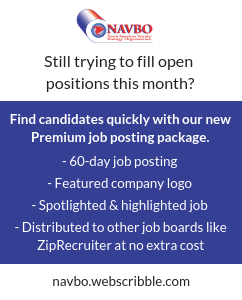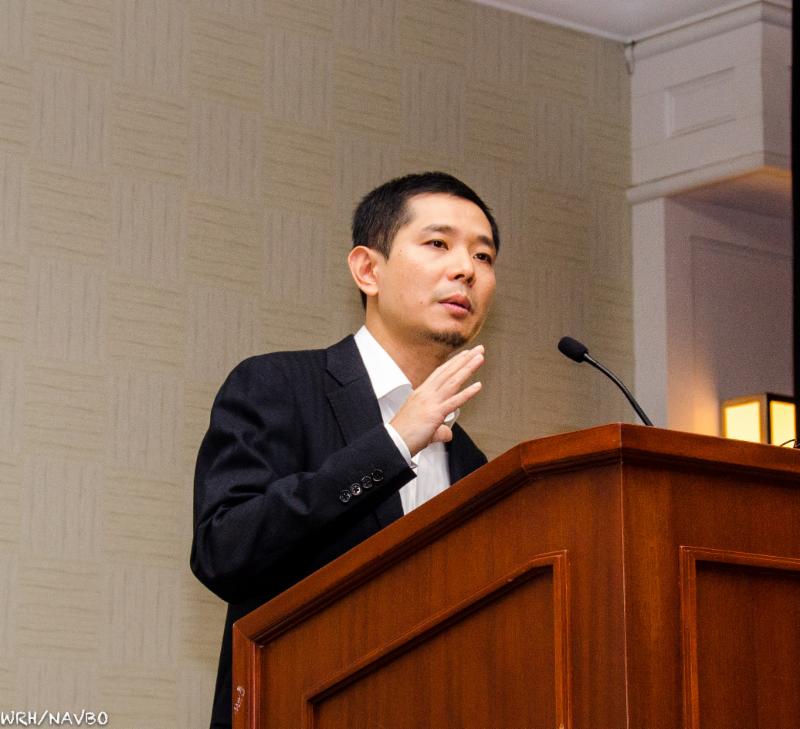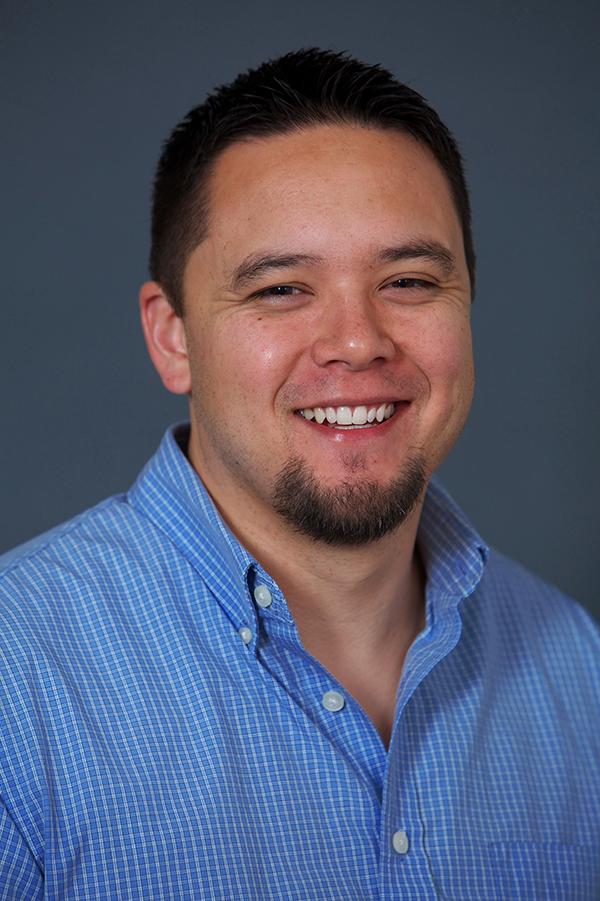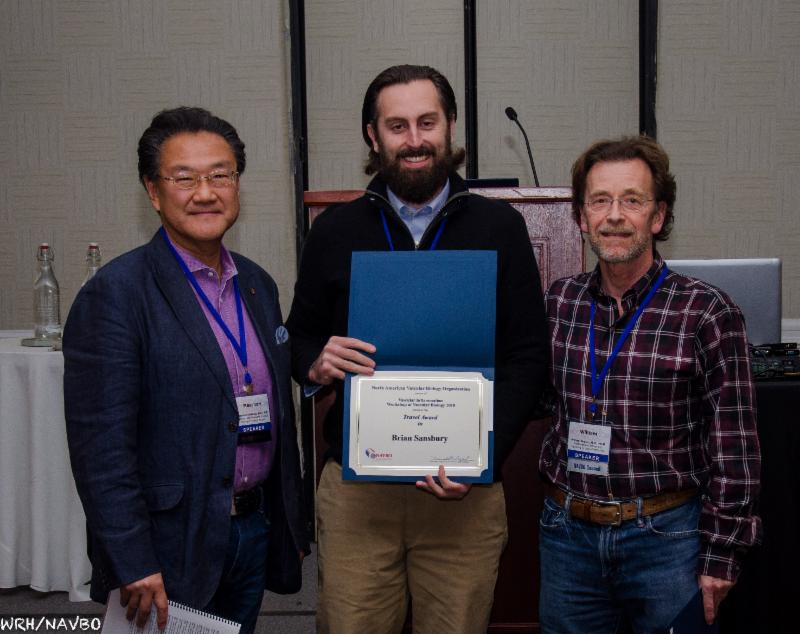Vascular Biology
Monterey, CA
Lymphatic Forum 2019
Austin, TX
May 30 - June 1, 2019
Vasculata 2019
Medical College of Wisconsin
July 13 - 18, 2019
|
UT Southwestern
Medical Center
|
|
Partner Network Advantage - New Job Board Feature
|

Why post your job on NAVBO's career center rather than going directly to the larger job networks?
Pricing on the mass job boards can vary, but to get a job noticed you typically have to sponsor it for $5 - $10 per day, which can add up quickly especially since you also pay for each click the job gets. When you add it all together, you could be spending up to $45 per day on your job posting. But, when posting a job on NAVBO's career center, you simply pay a flat fee! The Premium package includes our Exclusive Extended Partner Network - which means the jobs are broadcast to sites like ZipRecruiter and Jobs2Careers and more for a flat fee.
With special member pricing, you can post a job for as low as $300 with this Partner Network. You never pay for each click, just the flat fee on the NAVBO career center. In addition, the Premium package includes a 60-day job posting making it a great value. The Premium packages also offer features like having your company's logo featured on the career center homepage, having your job appear first in search results, and more.
|
Shop at Amazon?
Help Support NAVBO
|
Your data privacy and security are important to NAVBO. To that end, we have updated our privacy policy to reflect recent privacy and security regulation implementations and changes.
Please review our policy as time permits so you have a complete understanding of the data we have, why we have it, and how we use it.
Part of the updates relate directly to the European Union's new General Data Protection Regulation (GDPR) that went into place May 25. The GDPR seeks to improve the transparency of data usage and give end users more control over their own data. We believe these changes are important and will be compliant with the GDPR regulations.
Contact NAVBO if you have any questions or to
change your communication preferences.
Please note, you can unsubscribe to this newsletter at anytime by clicking on the SafeUnsubscribe in the footer.
|
|
 |
|
|
Yi Fan's Springer Junior Investigator Award Lecture
|
Yi Fan Delivered the 2018 Springer Award Lecture at VB2018
 Dr. Yi Fan, Assistant Professor of Radiation Oncology at the University of Pennsylvania's Perelman School of Medicine and recipient of NAVBO's 2018
Springer Junior Investigator Award, presented the annual Springer Lecture at Vascular Biology 2018 in Newport, Rhode Island, on October 17.
Dr. Fan's remarks, introduced by Michelle Bendeck of the University of Toronto and titled "Wnt-mediated endothelial transformation into mesenchymal stem cell-like cells induces chemoresistance in glioblastoma," recounted his laboratory's investigation of the limitations of anti-angiogenic therapies in the treatment of cancers. Dr. Fan's work suggests that an endothelial-to-mesenchymal transition, driven by hepatocyte growth factor, may occur in the tumor endothelium, resulting in a population of cells relatively resistant to anti-VEGF or anti-KDR agents but potentially sensitive to those that target the PDGF-beta receptor.
His presentation went on to explore the role of macrophages in cancer cell killing or persistence. In studies published last year in
Nature Communications, endothelial-selective knockout of IL-6 was shown to inhibit macrophage alternative activation and improve survival in a genetic glioblastoma mouse model, suggesting this interleukin as a possible new target in GBM. Taken together, Dr. Fan's promising work links endothelial transformation to several tumor characteristics that stand as barriers to more effective therapies: aberrant vasculature, immune suppression, resistance to genotoxicity, and insensitivity to conventional anti-angiogenic agents.
|
|
Get More Involved with NAVBO
|
Session Proposal for Vascular Biology 2020
We are seeking submissions in any area of research that members consider topical as well as ideas for the Vascular Therapeutics session. The featured workshops at Vascular Biology 2020 are Vascular Inflammation and the Biology of Signaling in the Cardiovascular System. Please note the deadline is fast approaching - April 8, 2019. See the web site for more details.
|
Seeking NAVBO Councilors
If you are a regular NAVBO member in good standing (dues paid through December 31, 2019) you are eligible to run for Council. If you would like to take an active leadership role in this society and help guide our mission, please take the time to apply for a position on the NAVBO Council. Six applicants will be chosen for the ballot. Deadline to submit is March 31, 2019. See http://www.navbo.org/membership/call-for-council-nominations. You will need to log in.
|
Registration is Now Open!
Register for this exciting new meeting!
Full program available online
Submit your abstract to the Lymphatic Forum 2019
The abstract submission deadline is March 15, 2019
|
|
Next Webinar - Stryder Meadows
|
 Angiopoietin-2 inhibition rescues arteriovenous malformation in a Smad4 HHT mouse model Angiopoietin-2 inhibition rescues arteriovenous malformation in a Smad4 HHT mouse model
Join us on March 14 - at 1:00pm EST for a webinar with Stryder Meadows of Tulane University. Dr. Meadow's presentation will discuss alternative approaches that target ANGPT2 function which may have therapeutic value for the improvement of HHT symptoms, such as AVMs.
This webinar is being co-sponsored by:
NAVBO Webinars are free for current NAVBO Members.
Don't Miss These Upcoming Webinars:
April 11 - William Sessa, Yale University
May 2 - Joyce Bischoff, Boston Children's Hospital
June 13 - Daniel Greif, Yale University
July 11 - Kishore Wary, University of Illinois at Chicago
And don't forget you can watch archived webinars as well - go to
|
|
Getting to Know More NAVBO Members
|
Meet Monica Lee
At the time Monica received the NAVBO Travel Award, she was a postdoctoral fellow at Yale University. She is now an Assistant Professor in the Physiology Department at the University of Illinois in Chicago. She presented her work,
Endothelial-specific Akt1 deficiency enhances atherosclerotic plaque progression, in the joint session on Signaling in Vascular Inflammationvas at Vascular Biology 2018. Monica is pictured here with workshop organizers, Ondine Cleaver and William Sessa.
Monica recently spoke with Membership Committee Member, Randa Breikaa of Nationwide Children's Hospital.
How did you first learn about NAVBO?
I learned of NAVBO during my postdoctoral training when my research began to delve into angiogenesis. Several faculty at my current research center were also actively involved with the organization, which largely helped with exposure to NAVBO.
Tell us about the research you presented and your mentor?
My postdoctoral work is centered around understanding the role of endothelial function in vascular homeostasis, namely in the context of Akt signaling. This was a naturally fitting topic for my training given the seminal work done on the Akt-eNOS kinase-substrate relationship achieved by my mentor, Dr. William C. Sessa. My current research is now focused on addressing how endothelial-specific Akt activity contributes to atherosclerotic disease progression.
What was your favorite event at the meeting?
I thoroughly enjoyed the poster sessions in the evenings. The set up provides a great atmosphere for scientific discussion amongst researchers at all levels, providing opportunities for networking and future collaborations.
Did you meet any people at the meeting who influence your research?
My current interests on endothelial Akt signaling seems to relate in part with many research interests of others, likely due to the vast influence of endothelial tissue in all organ function. This led to many engaging discussions at the meeting, allowing myself to see my own research from alternative perspectives.
What benefits did the travel award have for you?
The travel award helped promote my science and generate discussion on my presented research.
What benefits can a trainee expect from attending NAVBO?
The NAVBO conferences are a great opportunity to meet researchers at all levels in both your immediate and adjacent fields. The size of the conference is also one that allows for direct scientific interaction amongst the trainees and the thought leaders of the field.
What future goals do you have for your work?
Cardiovascular disease pathogenesis is preceded by the hallmarks of endothelial impairment, where several high-impact diseases are heavily associated with Akt dysregulation. I hope that my ongoing investigation into endothelial-specific Akt signaling will make a positive contribution to our current understanding of vascular health.
How can NAVBO help you achieve these goals?
The NAVBO meetings are a great venue to both present your research and to gain knowledge in all areas of vascular biology. I hope my involvement with NAVBO will continue to provide opportunities to share my research, while invoking scientific curiosity in the upcoming generation of academic scientists.
|
Meet Brian Sansbury

Brian is a postdoctoral fellow at Harvard Medical School in the Brigham and Women's Hospital. He presented his work entitled,
"Resolvin D1 promotes revascularization during limb ischemia via its receptor, ALX/FPR2," in the Resolution of Inflammation Session at Vascular Biology 2018.
Brian recently spoke with Membership Committee member, Mabruka Alfaidi of LSU Health Science Center.
How did you first learn about NAVBO?
I first learned about NAVBO in 2015 shortly after beginning my postdoc. I was looking for a vascular-focused meeting to share the findings of our latest study and NAVBO was recommended by my mentor. I presented at the pre-conference meeting for trainees and also presented a poster later in the meeting. It was a wonderful meeting and I was very excited to be able to attend again in 2018.
Tell us about the research you presented and your mentor.
I work in the lab of Dr. Matthew Spite in the Center for Experimental Therapeutics and Reperfusion Injury at Brigham and Women's Hospital and Harvard Medical School where we focus on better understanding the role of lipid mediators in the regulation of inflammation. My project looks specifically at how a class of lipid mediators, the resolvins, modulates tissue repair mechanisms in macrophages to enhance recovery from vascular injury.
What was your favorite event at the meeting?
I would say that the evening poster sessions were my favorite parts of the meeting. Not only do you get to see a vast array of impressive studies, you get to meet and network with other attendees. These types of supportive and collegial interactions are the real draw to the meeting for me.
Did you meet any people at the meeting who influence your research?
Absolutely. NAVBO does an unbelievable job putting together a program that includes so many leaders of multiple fields that it's hard not to meet or see someone that has influenced your work. Even better, most of these individuals are true teachers and mentors and are always willing to give valuable feedback and advice to trainees.
What benefits did the travel award have for you?
As a postdoc, you don't always have a lot of opportunity to present your work in a formal setting. So I jump at any chance that I get. I was lucky enough to travel to an international meeting earlier in the year to present to a non-vascular crowd. While this was a wonderful experience, it completely cleared out my travel funds for the year. Without this travel award I would not have had the resources to attend this meeting at all.
What benefits can a trainee expect from attending NAVBO?
There are several benefits that trainees gain from attending NAVBO in both the scientific and career development areas. Scientifically, you have the opportunity to hear about the cutting-edge work that is being done in vascular biology while also being able to present your own results and receive feedback from some of the most influential people in the field. Additionally, the structure of the meeting and its approachable size make it perfect for networking and meeting potential collaborators.
What future goals do you have for your work?
This project, specifically, is being finalized and submitted for publication soon. In the larger sense, our goals are to continue to advance our understanding of the role that lipid mediators and pro-resolution pathways play in chronic inflammatory diseases to inform the future development of novel therapeutics.
How can NAVBO help you achieve these goals?
This year's program included a new Joint Session: Resolution of Inflammation which was a great opportunity to introduce resolution physiology to the vascular community. Continuing to support and highlight the importance of resolution of inflammation in vascular disease at this meeting would facilitate greater collaboration and progress in combating chronic inflammation in vascular disease.
|
|
Spotlight on Trainees
(from the February 7 issue)
|
The Story Collider: collecting and sharing stories about science
The Story Collider, a nonprofit organization that has strived for nearly a decade to gather and share stories of personal encounters with science and share them via podcasts and live shows worldwide. With homes in fourteen cities across the US and internationally, The Story Collider works with scientific societies and academic institutions to produce dozens of live events featuring hundreds of stories. The Story Collider believes that "...everyone has a story about how science has impacted them -- whether they're physicists or comedians, neuroscientists or writers, geologists or cops, doctors or bartenders -- and that those stories, whether heartbreaking or hilarious, have the power to transform the way we think about science and whom it belongs to." Check out their podcasts to find the stories from fellow trainees, or find a live show near you!
|
|
Recent Publications by NAVBO Members
|
Mature vessel networks in engineered tissue promote graft-host anastomosis and prevent graft thrombosis
PNAS
Graft vascularization remains one of the most critical challenges facing tissue-engineering experts in their attempt to create thick transplantable tissues and organs.
Read more
Staphylococcus aureus alpha toxin activates Notch in vascular cells
Angiogenesis
Staphylococcus aureus infection is one of the leading causes of morbidity in hospitalized patients in the United States, an effect compounded by increasing antibiotic resistance.
Read more
CD36 mediates albumin transcytosis by dermal but not lung microvascular endothelial cells - role in fatty acid delivery
American Journal of Physiology-Lung Cellular and Molecular Physiology
In healthy blood vessels, albumin crosses the endothelium to leave the circulation by transcytosis. However, little is known about the regulation of albumin transcytosis or how it differs in different tissues; its physiological purpose is also unclear.
Read more
Normalizing Function of Tumor Vessels: Progress, Opportunities, and Challenges
Annual Review of Physiology
Abnormal blood and lymphatic vessels create a hostile tumor microenvironment characterized by hypoxia, low pH, and elevated interstitial fluid pressure. These abnormalities fuel tumor progression, immunosuppression, and treatment resistance.
Read more
Solid stress in brain tumours causes neuronal loss and neurological dysfunction and can be reversed by lithium
Nature Biomedical Engineering
The compression of brain tissue by a tumour mass is believed to be a major cause of the clinical symptoms seen in patients with brain cancer. However, the biological consequences of these physical stresses on brain tissue are unknown.
Read more
Evolution of hemodynamic forces in the pulmonary tree with progressively worsening pulmonary arterial hypertension in pediatric patients
Biomechanics and Modeling in Mechanobiology
Pulmonary arterial hypertension (PAH) is characterized by pulmonary vascular remodeling resulting in right ventricular (RV) dysfunction and ultimately RV failure. Mechanical stimuli acting on the vessel walls of the full pulmonary tree have not previously been comprehensively characterized. The goal of this study is to characterize wall shear stress (WSS) and strain in pediatric PAH patients at different stages of disease severity using computational patient-specific modeling.
Read more
|
Industry News (from the February 7 issue)
|
NHLBI Request for Information to explore role of sex/gender in vascular disorders
To identify pressing questions related to mechanisms that increase women's risk or resilience for certain heart, lung, blood, and sleep diseases, the National Heart, Lung, and Blood Institute has issued a Request for Information, titled "Understanding the Health of Women and the Role of Sex/Gender in Mechanisms of Heart, Lung, Blood, and Sleep Diseases and Disorders." The RFI offers the research community, health care professionals, patient advocates, and others an opportunity to provide input on topics ranging from scientific gap areas in mechanisms of HLBS diseases, to training and resource needs, among other topics. Responses may be submitted via email to [email protected] by March 15, 2019; for proper routing, be sure to include the Notice number (NOT-HL-18-660) in the subject line.
Surprising protection from cognitive impairment associated with antihypertensive therapies
Recent findings of the Sprint clinical trial, published in JAMA and reported in the NYTimes, revealed that patients who received intensive treatment for hypertension were less likely to develop minor cognitive and memory impairments than those receiving standard treatment. Such cognitive lapses are viewed as frequents precursor to development of Alzheimer's disease and other forms of dementia. The cardiovascular events arm of the trial was stopped in 2015, based on early recognition of significant benefits derived from reducing systolic pressure to below 120 mmHg, compared to the standard target of <140 mmHg. The cognitive arm of the study, called Sprint Mind, continued to follow the participants for three more years.
Fearless predictions of advances in science and medicine for 2019
With the new year upon us and the glories of 2018 receding in the rearview mirror, our thoughts turn to what lies ahead. The staff of STAT has compiled, based on their surveys of opinion leaders in business, policymaking, and academe, a list of possible hot areas in science, medicine, and tech for the months ahead. Entries include prospects for a universal influenza vaccine, improved control over our personal health information, and better understanding of antibiotic resistance. Check back in December to grade the clairvoyance of the experts.
|
|
|